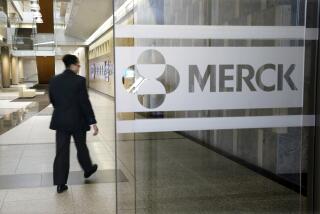Merck to Cut 5,100 Jobs by Year-End
Pharmaceutical giant Merck & Co., under siege over revenue lost since it recalled arthritis drug Vioxx, will have cut about 5,100 jobs by year-end, 700 more than first planned, and will slash costs by $2.4 billion over four years, Chairman and Chief Executive Raymond V. Gilmartin said Tuesday.
Gilmartin, speaking to about 250 analysts during Merck’s annual business briefing, said the company was accelerating changes to increase growth, but would stick with its strategy of shunning major mergers. Instead, it will seek new drug candidates through more licensing deals and internal research.
“Our focus now is on the future, on renewing the growth of the company,” Gilmartin said.
Gilmartin reaffirmed earnings guidance for this year and next, saying Merck expects earnings per share of $2.59 to $2.64 for 2004 and $2.42 to $2.52 for 2005. Analysts surveyed by Thomson First Call were expecting $2.62 and $2.47, respectively.
Merck shares rose 57 cents to $29.62 on the New York Stock Exchange.
Merck’s 2004 forecast was reduced by 50 cents to 55 cents after it pulled Vioxx from the market worldwide Sept. 30 when its own study showed long-term use of the drug, which had annual sales of $2.5 billion, increased heart attack risk. Shares of the Whitehouse Station, N.J.-based company have since plunged from about $45, and it is beset by lawsuits. Merrill Lynch estimates Merck’s legal liability at as much as $18 billion.
Merck general counsel Kenneth C. Frazier said 475 personal injury lawsuits, covering 1,100 plaintiffs, had been filed as of Nov. 30, about 60% of them in state courts. He said the company’s strategy would be to try to move as many state cases as possible to federal courts, have the litigation initially coordinated by one federal judge, fight each case vigorously and block any attempts at class-action lawsuits.
Various other lawsuits also have been filed, including at least 12 alleging that the company misled investors and broke federal securities laws.
The 2005 earnings forecast does not include reserves to cover Vioxx litigation, Gilmartin noted.
The litigation’s effect will be the key to Merck’s future, said pharmaceuticals analyst Hemant Shah of HKS & Co. in Warren, N.J.
He said Merck’s situation was “not as dire as the stock suggests,” as it had several interesting drugs in early testing, including ones for obesity, diabetes, stroke and Alzheimer’s disease.
More to Read
Inside the business of entertainment
The Wide Shot brings you news, analysis and insights on everything from streaming wars to production — and what it all means for the future.
You may occasionally receive promotional content from the Los Angeles Times.










